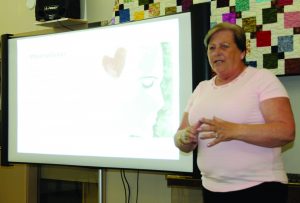Presentation discusses responses to human trafficking
By Rob Vogt Local Press Writer
It was a chance to learn more about an organization that helps victims of human trafficking.
About 35 people gathered at the Claresholm Seniors’ Drop-in Centre on June 9 to hear a presentation by Liz Gibson, program manager for Rapid Exit from Sexual Exploitation and Trafficking, or RESET.
It was the latest installment of “Opportunities for Growth”, a series of public education sessions put on by the Claresholm and District Chamber of Commerce and Claresholm Economic Development.
The RESET Society of Calgary’s mission is to provide comprehensive, individualized support and safe housing to women and girls, as young as 16, exiting sexual exploitation and trafficking so that they may transform their lives.
Their vision is for sexually exploited women and girls to know there is a way out.
RESET provides 24/7, intensive one-on-one case management, wrap-around, non-time-limited programming, and progressive levels of supportive housing.
Since the organization began 33 years ago, they have supported more than 1,000 women and girls, providing them with the tools and resources to rebuild their lives.
Gibson noted sexual exploitation, trafficking and the nature of sex work has changed a lot in Canada, especially in the last 25 years.
Technology has enabled and affected the sexual exploitation and trafficking of women.
Online advertising, escort agency websites, online chat, and texting has provided anonymity to pimps, traffickers, johns, and victims.
Advertising and communication for the purpose of sexual exchange has become easier and faster than ever before.
She said RESET has to adapt and update their services to meet the ever-changing needs of the women they serve, and the many issues that face them.
Participants can self-refer, may hear about RESET through word of mouth or individual research, or their website.
Referrals can come from police services; victim services; hospitals; corrections services; and other social support agencies.
The program has three phases.
Phase 1 provides housing to clients from the point of intake. It is staffed 24/7 in order to support new intakes during this stabilization period.
Staff run daily programs aimed to begin the healing process and become accustomed to classroom learning in preparation for Phase 2.
Participants are able to meet their immediate needs such as supported medical detox, regular meals, and seeing a doctor.
Clients receive support from staff in connecting with probation officers to maintain conditions.
There are also external referrals to income support and ID clinics and drug treatment programs.
Phase 2 is the Exploitation, Intervention and Transition or EXIT program. It is a 12-plus month program that enables women and their children to stabilize, heal and reconnect.
The EXIT classroom is recovery-oriented; relationship-based; has a comprehensive life skills curriculum, including an Indigenous component; has full-time Monday to Friday classes; and one-on-one case management with a keyworker.
Phase 3 is community support. It includes work with clients to prepare a plan for post-graduation from the program; registering for school and applying for related funding; employment skills and career preparation; solidifying independent housing and related resources; and educational scholarships.
Community support is accessible indefinitely if any alumni or past participants need support after graduation or leaving the program.
Gibson said girls are vulnerable.
Men groom them by making them feel special, helping them get their hair and nails done, giving them presents, and luring them in.
They then take pictures of the girls and blackmail them to stay in the exploitation relationship.
It is becoming more and more prolific because of the money involved.
A pimp can make more than $5,000 in one night and more than $300,000 in one year from one woman.
Anyone interested in more information can visit www.RESETCalgary.ca or phone 1-403-205-5533.
(For related information please see page seven)

